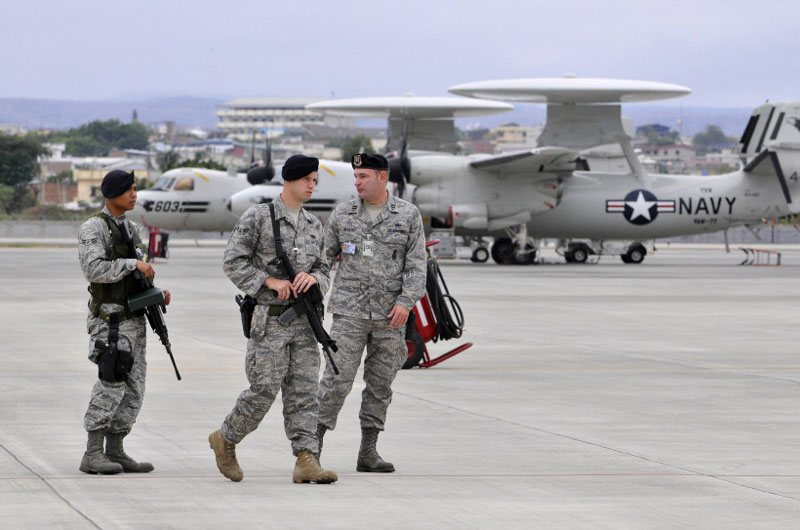Following a partial reform of the Constitution announced by President Daniel Noboa, on September 20, 2024, the United States Embassy confirmed that they will not request authorization to establish a military base in the country.
In light of recent discussions surrounding Ecuador’s constitutional reforms and increased military cooperation, the United States Embassy in Quito has emphasized that the U.S. government has no plans to request permission to establish a permanent military base in Ecuador.
This announcement came as Admiral Linda Lee Fagan, commander of the U.S. Coast Guard, visited Quito to strengthen bilateral ties, particularly in combating maritime crime and transnational threats.
Deepening Bilateral Cooperation
During her visit, Admiral Fagan reaffirmed the United States’ commitment to supporting Ecuador’s efforts to combat organized crime at sea. In a formal ceremony attended by Ecuadorian Foreign Minister Gabriela Sommerfeld Rosero and Navy Commander Jaime Vela, Fagan signed an agreement transferring two 33.5-meter patrol boats from the U.S. Coast Guard to the Ecuadorian Navy. The vessels, while free of cost, require Ecuador to cover the expenses of reconditioning and transportation.
The United States is broadening its defense cooperation with Ecuador through agreements signed in 2023, such as the Agreement Relating to Operations Against Illicit Transnational Maritime Activities and the Agreement Relating to the Status of Forces.
These pacts regulate the terms under which U.S. military personnel temporarily serve in Ecuador for training, infrastructure development, and capacity-building initiatives.
Military Base Proposal and U.S. Response
This recent uptick in U.S.-Ecuador defense collaboration coincides with Ecuadorian President Daniel Noboa Azín’s proposal to amend the country’s constitution to allow for increased international military cooperation.
The proposed reform would eliminate the ban on foreign military bases, established in the 2008 Constitution under former President Rafael Correa. In 2009, this restriction forced the closure of the U.S. military’s base in Manta.
President Noboa’s proposal seeks to modify Article 5 of the Constitution, which currently prohibits the establishment of foreign military bases and the transfer of national military installations to foreign forces. If the reform passes, the remaining constitutional phrase would declare Ecuador “a territory of peace.”
Noboa’s request is under review by Ecuador’s Constitutional Court, and, if approved, the proposal could be put to a national referendum.
Despite these constitutional discussions, the U.S. Embassy in Quito released a statement confirming that, while cooperation with Ecuador is expanding in terms of training, equipment, and joint operations, the U.S. does not intend to request authorization for a permanent military presence in the country.
Instead, the focus remains on addressing shared security challenges, particularly in the fight against drug trafficking, transnational criminal organizations, and illegal fishing.
Broader Regional Support
In addition to these agreements, the U.S. Southern Command recently funded a $1.5 million hangar construction project at the AUCA Regional Logistics Center, located on Ecuador’s northern border. This facility will support the maintenance and refurbishment of coastal patrol vessels, further enhancing Ecuador’s maritime defense capabilities.
Admiral Fagan, during her visit, met with Ecuadorian military and government officials, including Foreign Minister Sommerfeld and Navy Commander Vela, to discuss these joint strategies. She underscored the strong relationship between the two nations’ maritime forces, stating, “Together, we will continue to defeat criminal groups that threaten the stability and security of our seas.”
Constitutional Reform Debates
Meanwhile, President Noboa’s constitutional reform proposal has sparked debate within Ecuador. Legal experts and civil society organizations have weighed in on the issue. A foundation called Jurists in Action and Victory submitted an amicus curiae brief to the Constitutional Court, urging the judges to reject the proposal, calling it unconstitutional and a threat to Ecuador’s sovereignty.
In contrast, the U.S.-based organization 1800Migrante expressed support for the reform but recommended that it be leveraged to secure Temporary Protected Status (TPS) for Ecuadorians living in the United States. Williams Murillo Vera, one of the group’s representatives, proposed that if Ecuador signs a ten-year agreement for U.S. military presence, TPS should be granted to Ecuadorians for an equivalent duration.
What Lies Ahead
As the constitutional debate unfolds, the focus remains on strengthening U.S.-Ecuador security relations, particularly in the maritime domain. Both nations have underscored the importance of combating criminal networks and safeguarding their shared interests without the establishment of a permanent military base.
Ecuador’s Constitutional Court is expected to issue a ruling on the proposed reform within 30 days, after which the country’s National Assembly will debate the matter. If approved, Ecuadorians will have the final say through a national referendum, deciding whether to allow foreign military presence on their soil for the first time since 2009.



0 Comments